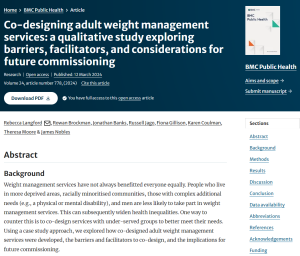Co-designing health services – what should commissioners consider?
13 March 2024
Building relationships, creating supportive organisational cultures and developing the evidence base are key considerations for commissioners planning to co-design health services. These are the findings from an ARC West led project looking at co-design in weight management services, published in BMC Public Health.
Co-design is where service users play an active role in designing services, with professionals sharing power and decision making with them. It can be an effective way of developing services for under-represented groups who don’t engage with standard services.
However, it can also be a challenge for commissioners to work in this way. Co-design takes more time and effort than traditional service design. It can result in services that don’t fit standard models, which can have implications in terms of measurement and funding.
The research team selected four case studies of adult weight management services in south west England where co-design had been planned. The services represented a range of populations and settings.
Co-design approaches ranged from light touch to in-depth. Two projects didn’t manage to fully execute their co-design plans because of time and funding constraints.
For each case study, the researchers recruited and interviewed commissioners and providers of the services, and where possible, community members involved in co-design activities. Co-design was viewed positively by participants as a way of creating more appropriate services and better engagement, potentially reducing inequalities.
The research team identified three key considerations for those planning to co-design services:
- Build relationships: Connect with communities, develop shared values and strengthen relationships
- Create supportive organisational cultures: Get comfortable with uncertainty, reflect on commissioning practices, think about the long game
- Develop the evidence base: Share success and failure, use evaluation to capture the long-term, upstream impacts
Their full considerations are available to download as a PDF.
Beki Langford, Research Fellow at NIHR ARC West and a lead author of the paper, said:
“Co-designing services is increasingly popular, but it can be a challenge in the context of traditional funding and commissioning practices. Our analysis of these case studies highlighted the bravery and innovation required to create services this way.
“Our findings offer pointers for those who want to try it. This is important knowledge if co-design is going to become more standard practice.”
Will Chapman, Associate Director for Prevention and VCSE Partnership at Gloucestershire Integrated Care Board, led one of the projects covered in the paper. He said:
“We know that, due to the complexity of causal factors at play, there is no one-size fits all solution to supporting people to adopt healthy behaviours. As commissioners we recognise that the solutions do not lie solely with us to design behind closed doors and impose service-led solutions. Instead, we must shift our system paradigm to one where partners and communities are at the very heart of design work, where we are truly enacting social design with and for people.
“How we involve communities in defining, designing and delivering solutions is highly context specific. It requires a willingness to be led by the community itself rather than imposing preconditions on what exactly collaboration might look like or the areas it might address. It was with this in mind that we approached our work around men’s health with the Long Table in Stroud. This social design project was a true co-production. The men defined the problem, thought about solutions, enacted those solutions, defined how we’d measure success.
“This represents a move away from more traditional commissioning approaches to one where power is shared, with the people facing the health challenge, and the organisations to which they are most connected. This release of control takes bravery in a system that expects outcomes to be pre-defined, closely monitored and controlled; it can be hard to navigate.
“It is clear though that the benefits of working in this way outweigh the difficulties, as evidenced by the fact that three years on from its inception the men’s group is still meeting. It clearly shows that it is something that the men themselves value, rather than value as defined by the system. In this sense it is the co-creation of value, not simply of services, which is our ultimate goal.”
Paper
